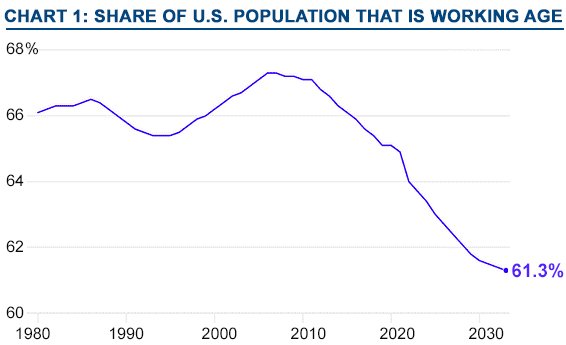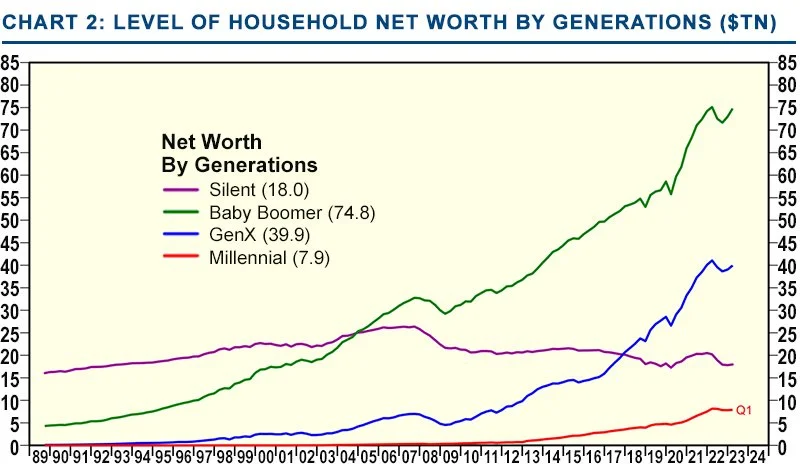
Founders Perspctive
Explore: Wealth Planning Founder’s Perspectives Books
The Major Forces Molding Our Future
John Merrill, July 2023
Daily changes within our economy are imperceptibly small except in highly unusual circumstances like the impact of Covid. Yet our economy is always in a state of change, driven by powerful long-term economic forces.
Today, the dominant factors steering our economy are demographics, social strains, government policies/debt, geopolitical realignment, technology, and climate change. These forces will shape our future.
Source: The WSJ, OECD & Moody’s Investor Service, Chart: Axios Visuals
Demographics. The world population is getting older as people live longer and have fewer children. The decline in the (traditional) working age population will continue. See Chart 1. Without a pickup in productivity, economic growth will slow, and standards of living will stagnate.
Social Strains. For much of the past three decades a disproportionate amount of income and wealth creation went to a smaller percentage of people, particularly those with capital in either the private or public markets. Most of today’s wealth resides within the Boomer generation (and this is concentrated in the wealthiest 10%). See Chart 2. Also, low income wages stagnated as many jobs moved offshore while minimum wages barely budged. This has strained social cohesion.
Source: Yardeni Research, Inc.
Government Policies/Debt. Government spending has skyrocketed. Given the flood of new money coming from the Infrastructure, Chips, and Clean Energy bills (on top of Entitlements and Defense increases), it is not likely to fall off. And of course, so much of it is borrowed (deficit spending) that the interest bill to the Federal government is soaring.
Geopolitical Realignment. Francis Fukuyama's The End of History in 1989 suggested that after the fall of communism, Western liberal democracy had "won" and may be regarded as the final evolution of human government. For a time, this notion gained wide acceptance. Yet history did not end and there has been a rapidly growing divergence between liberal democracies and autocratic governments, particularly since Xi Jinping became president of China.
Technology. Advancements in technology over the past several decades have irrevocably changed the way we live and work. From the personal computer to the internet, email, smart phones, Zoom, and on and on. Now we are told that AI (artificial intelligence) will change our world even more dramatically than its precursors and at a faster pace.
Climate Change. Climate change is real although the causes extend far beyond fossil fuels. For example, just the increase in carbon dioxide from California’s 2020 wildfires was estimated in Environmental Pollution (10/22) to be twice the total of all California’s reductions over 15 years.
How might these disparate trends interact to mold our future?
Efficiency to Resilience. This is the force behind reshoring and increased defense budgets. Interest rates will be higher, inflation will likely be higher too as we turn from free markets and free trade toward industrial policies and managed trade. In addition, the impact of weather events – flooding, wind damage, extreme heat, droughts – will take ever greater resources just to fortify what is in place. This implies higher inflation and higher interest rates than we recently enjoyed.
Reductions in Inequality. Entitlement reform is essential if we are to pay for the increased demands on government. (Reduction in benefits to the wealthy and higher paid will be necessary.)
Wages will likely continue to rise across the bottom half of the income spectrum as a shrinking workforce increases labor’s bargaining power. Income taxes are likely to be even more progressive along with higher estate transfer costs.
New Global Powers. China may “hollow out” as it suffers from a rapidly aging workforce (a result of the one-child policy) along with the rise in capital flight and out migration by some of the wealthiest and brightest. The Middle East and Africa are likely to gain increasing power due to younger demographics and commodity wealth. India should benefit from its young, tech savvy workforce.
AI, the Wild Card. While many worry about a tragic Terminator type of outcome, there is real promise in areas like education, health care, and routine back-office services. If we are to have the long-awaited productivity boom, this will be the source.



